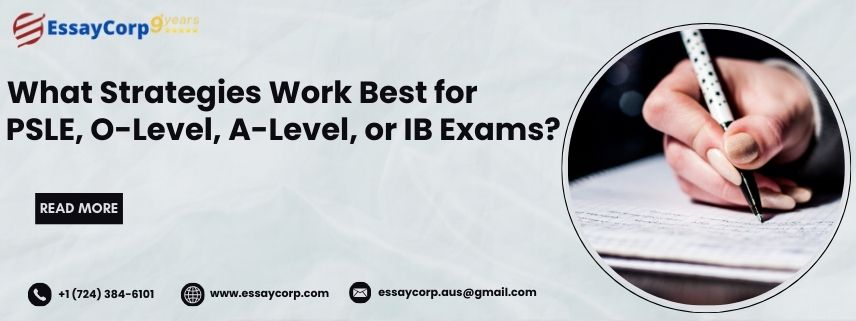Academic success in major examinations requires more than just studying hard—it demands strategic planning, effective techniques, and exam-specific approaches. Whether you're preparing for Singapore's Primary School Leaving Examination (PSLE), O-Levels, A-Levels, or the International Baccalaureate (IB), each assessment has unique characteristics that call for customized strategies.
Understanding the Exam Landscape
Before diving into specific strategies, it's crucial to understand what makes each examination unique. The PSLE serves as a foundational assessment for 12-year-olds, focusing on core subjects and basic competencies. O-Levels represent the first major academic milestone for teenagers, while A-Levels and IB programmes prepare students for university-level thinking and independent research.
The Foundation: Universal Study Principles
Regardless of which exam you're tackling, certain fundamental principles apply across all levels of academic assessment.
Time Management and Planning
Effective time management begins with understanding your exam timeline and working backwards from test dates. Create a study schedule that accounts for all subjects while allowing flexibility for challenging topics that may require additional attention.
Active Learning Techniques
Passive reading rarely leads to deep understanding. Instead, engage with material through summarizing, questioning, and teaching concepts to others. This approach works particularly well for complex subjects across all examination levels.
PSLE Strategies: Building Strong Foundations
The Primary School Leaving Examination requires a different approach compared to more advanced assessments, focusing on fundamental skills and concepts.
Subject-Specific Approaches for PSLE
English Language
For PSLE English, emphasis should be placed on reading comprehension and composition writing. Regular reading of age-appropriate materials helps build vocabulary and understanding of sentence structures.
Composition Writing Strategies
Practice different types of compositions regularly, focusing on clear storylines, descriptive language, and proper grammar. Create a bank of useful phrases and expressions that can be adapted for various topics.
Key Focus Areas:
-
Vocabulary building through daily reading
-
Grammar rules and sentence construction
-
Comprehension techniques and inference skills
Mathematics
PSLE Mathematics requires strong problem-solving skills and conceptual understanding rather than rote memorization.
Problem-Solving Methodologies
Teach students to break down word problems into smaller, manageable steps. Use visual aids like diagrams and charts to represent mathematical relationships clearly.
Science
Primary science focuses on observation, experimentation, and basic scientific concepts. Encourage hands-on learning and real-world applications of scientific principles.
Mother Tongue Languages
Whether studying Chinese, Malay, or Tamil, consistent practice in reading, writing, and oral communication is essential. Cultural context and traditional values often play important roles in mother tongue assessments.
PSLE Study Environment and Routine
Young learners benefit from structured yet flexible study routines. Create designated study spaces free from distractions, and incorporate regular breaks to maintain focus and motivation.Consistency + Practice + Understanding = Success. Focus on building solid foundations rather than advanced techniques.
O-Level Excellence: Transitioning to Higher-Order Thinking
O-Level examinations mark a significant step up in academic rigor, requiring students to demonstrate analytical thinking and deeper subject mastery.
Strategic Subject Selection
Choose subjects that align with your strengths, interests, and future academic goals. Balance challenging subjects with those you find more manageable to optimize your overall performance.
Core Subjects Mastery
English Language and Literature
O-Level English demands sophisticated writing skills and critical analysis. Practice essay writing regularly, focusing on argument development, evidence presentation, and stylistic variety.
Literature Analysis Techniques:
-
Close reading for themes, symbols, and literary devices
-
Contextual understanding of historical and social backgrounds
-
Comparative analysis between different texts
Mathematics and Sciences
These subjects require both conceptual understanding and application skills. Practice past papers extensively, focusing on question patterns and marking schemes.
Humanities Subjects
History, Geography, and Social Studies require strong memory techniques combined with analytical skills. Create timeline charts, concept maps, and case study summaries for effective revision.
O-Level Examination Techniques
Time Allocation Strategy
Spend the first 5-10 minutes of each paper reading through all questions and planning your approach. This prevents rushing and ensures you tackle questions in order of confidence and point value.
Essay Writing Excellence
Develop a systematic approach to essay questions: analyze the question requirements, create an outline, write with clear topic sentences, and always leave time for proofreading.
A-Level Mastery: University Preparation
A-Level examinations require independent thinking, extensive knowledge, and sophisticated analytical skills that prepare students for university-level study.
Subject Combination Strategy
Select subjects that complement each other and align with your university aspirations. Consider the synergies between subjects and how they can reinforce your overall academic profile.
Advanced Study Techniques
Research and Analysis Skills
A-Level success requires going beyond textbooks. Develop skills in academic research, source evaluation, and independent analysis. Use reputable academic databases and stay updated with current developments in your subjects.
Critical Thinking Development
Practice questioning assumptions, evaluating evidence, and constructing logical arguments. These skills are essential across all A-Level subjects, from sciences to humanities.
Subject-Specific Excellence
Sciences (Physics, Chemistry, Biology)
Master both theoretical concepts and practical applications. Regular laboratory work and data analysis practice are crucial for developing scientific reasoning skills.
Laboratory Skills Enhancement:
-
Precise measurement and observation techniques
-
Data collection and statistical analysis
-
Experimental design and hypothesis testing
Humanities and Social Sciences
Develop sophisticated essay writing skills that demonstrate deep understanding, critical evaluation, and original thinking. Practice synthesizing information from multiple sources.
Common A-Level Pitfall:
Avoid memorizing model answers. Examiners look for original thinking and personal insight, not regurgitated responses.
IB Excellence: Global Perspective and Holistic Development
The International Baccalaureate programme emphasizes international-mindedness, critical thinking, and holistic development through its unique structure and assessment methods.
Understanding the IB Framework
Success in IB requires mastering six subject groups while excelling in the three core components: Extended Essay (EE), Theory of Knowledge (TOK), and Creativity, Activity, Service (CAS).
Subject Group Strategy
Choose subjects from all six groups (Studies in Language and Literature, Language Acquisition, Individuals and Societies, Sciences, Mathematics, and The Arts) that create a balanced yet focused academic profile.
Core Component Excellence
Extended Essay Mastery
The 4,000-word Extended Essay requires independent research skills and academic writing proficiency. Choose a topic that genuinely interests you and allows for substantial investigation.
EE Success Strategies:
-
Start early with thorough topic research and refinement
-
Develop a clear research question and methodology
-
Maintain regular communication with your supervisor
-
Follow academic citation standards meticulously
Theory of Knowledge (TOK)
TOK encourages critical thinking about knowledge itself. Engage actively with TOK concepts and relate them to your other IB subjects for deeper understanding.
TOK Essay and Presentation Tips
Use real-life situations and knowledge issues from your own subjects to illustrate TOK concepts. This demonstrates genuine engagement with the program's interdisciplinary nature.
Creativity, Activity, Service (CAS)
Plan your CAS experiences to demonstrate personal growth, challenge, and genuine service to others. Document your reflections regularly throughout the program.
IB Assessment Strategies
Internal Assessment Excellence
Internal assessments often carry significant weight in final grades. Understand the specific criteria for each subject and plan your IA projects carefully.
Embrace the IB learner profile qualities: be inquiring, knowledgeable, thinking, communicating, principled, open-minded, caring, risk-taking, balanced, and reflective.
Universal Success Strategies
Mental Health and Well-being
Academic success is impossible without maintaining physical and mental health. Develop healthy sleep patterns, exercise regularly, and practice stress management techniques.
Stress Management Techniques
Learn and practice relaxation techniques such as deep breathing, meditation, or progressive muscle relaxation. These skills are valuable both during preparation and examinations.
Building Resilience
Develop a growth mindset that views challenges as opportunities for learning. Build resilience through regular self-reflection and learning from both successes and setbacks.
Technology and Study Tools
Leverage technology effectively for learning while avoiding digital distractions. Use apps for time management, flashcards, and collaborative study, but maintain focus during study sessions.
Digital Organization
Organize digital files systematically, use cloud storage for backup, and maintain consistent naming conventions for easy retrieval of study materials.
Peer Learning and Support Networks
Form study groups with motivated classmates, engage in peer teaching, and seek help when needed. Academic success is often enhanced through collaborative learning.
Teacher and Counselor Relationships
Build positive relationships with teachers and school counselors. They provide valuable insights, feedback, and support throughout your academic journey.
|
Exam |
Level |
Focus |
Strategy Highlights |
Difficulty |
|
PSLE |
Primary 6 |
Foundations in core subjects |
Practice papers, strong basics |
Moderate |
|
O-Levels |
Secondary 4/5 |
Broad subject coverage |
Past papers, structured answers |
High |
|
A-Levels |
Pre-University |
Critical thinking & depth |
Essay outlines, evaluation skills |
Very High |
|
IB |
Pre-University (2 years) |
Global perspective & balance |
Time management, real-world examples |
Extremely High |
Conclusion
Success in PSLE, O-Level, A-Level, or IB examinations requires more than intelligence—it demands strategic planning, consistent effort, and the right mindset. Each examination level presents unique challenges, but the fundamental principles of effective study, time management, and holistic development remain constant.



